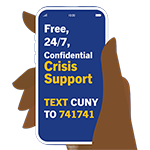From time to time, CUNY students or employees may contract an infectious disease that can be spread through casual contact. In such circumstances, which could impact the health and safety of the CUNY community, students and employees should follow this protocol. If a student or an employee is in doubt whether an infectious disease is covered, he/she should contact the campus our office.
When students contract an infectious disease that can be spread through casual contact, they should immediately report it to the campus Health Services Director. If the campus Health Services Director is unavailable, they should report it to the campus Chief Student Affairs Administrator. If the Student Affairs office is closed, they should report it to the campus Public Safety office. When employees contract an infectious disease that can be spread through casual contact, they should immediately report it to the Director of Human Resources, who is responsible for reporting it to the campus Health Services Director. If the Human Resources office is closed, they should report it to the campus Public Safety office. Employees should also inform their supervisor or department chair.
When a child in the campus Child Care Center contracts an infectious disease, the Child Care Center Director should report it to the campus Health Services Director and to the campus Chief Student Affairs Administrator. If the campus Health Services Director is unavailable and the Student Affairs office is closed, the Child Care Center Director should report it to the campus Public Safety office.
The campus Public Safety office should report cases involving students to the campus Chief Student Affairs Administrator, cases involving employees to the Director of Human Resources, and cases involving a child in the campus Child Care Center to the Health Services Director and to the Chief Student Affairs Administrator.
Please note the following information for CUNY School of Law:
- Health Services Director (name, phone, e-mail, room)
- Chief Student Affairs Administrator (name, phone, e-mail, room)
- Director of Human Resources (name, phone, e-mail, room)
- Office of Public Safety (phone, e-mail, room)
Reporting should include as much information as possible, including:
- names of the individuals involved (may be withheld for a child in Child Care Center)
- all available contact information for the individuals involved:
- phone numbers (e.g., cell, home, office)
- e-mail address(es)
- emergency contact information
- individual information:
- classes (indicate if continuing education classes)
- co-curricular activities including clubs and sports
- any other campus contact (e.g., tutoring, campus jobs, work-study, camps)
- residence hall room numbers
- friends and/or faculty members and their respective contact information
- does the individual have a child in the campus child care center
- the date and time of the following:
- diagnosis and/or symptoms
- treatment
- campus notification
Members of the University community who become aware of a student or an employee who has contracted an infectious disease that can be spread through casual contact are also encouraged to contact the campus Health Services Director or the Director of Human Resources, as appropriate, with that information.
The campus Health Services Director is responsible for notifying the NYC Department of Health and Mental Hygiene (as required), and other appropriate campus officials via e-mail or phone, and for notifying the University Director of Environmental, Health, Safety, and Risk Management and the University Director of Mental Health and Wellness Services via e-mail to HEALTH-REPORTING@LISTSERV.CUNY.EDU. If the Health Services Director is unavailable, the Chief Student Affairs Administrator is responsible for cases involving students and the Director of Human Resources is responsible for cases involving employees.
Confidentiality of personal information, including medical information and the name of the individual, must be respected to the fullest extent possible. Such information shall be disclosed only on a need-to-know basis.
If contact tracking is required, the campus Health Services Director is responsible for coordinating with NYC Department of Health and Mental Hygiene, the campus Registrar and the Chief Student Affairs Administrator, for students, or the Director of Human Resources, for employees. Once contact tracking is complete, or if contact tracking is not required, the campus Health Services Director must document the tracking or the decision not to track.

